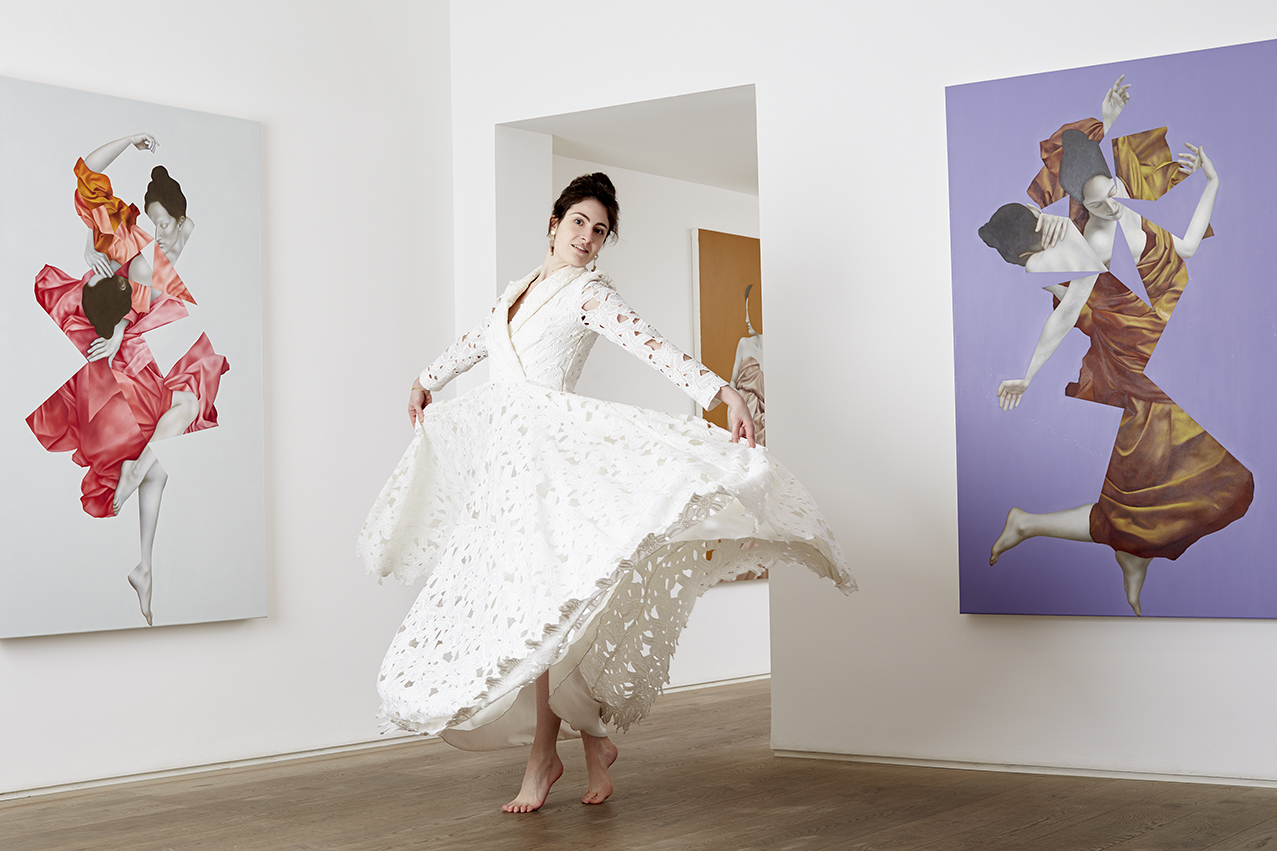Thursday, 8 December 2016
Focus On....Juliette Mahieux Bartoli
I first met Juliette at an afternoon tea party earlier this year. During our conversation the subject turned to what we we did. I convinced her to show me her work and she spoke about her up coming exhibition which would launch in November. The few pieces she was able to show me totally whet my appetite for more and have had me waiting with bated breath for the rest until now. When Juliette showed me around her beautiful show I knew there and then I had to photograph her with her work. Her solo exhibition runs at the Kristin Hjellegjerde gallery 533 Old York Road, London, SW18 1TG until the 23rd of December, so you still have time to go see it. You will be glad you did.
Here is her story
D: Tell me a bit about yourself and your journey in art so far.
J: I live and practice in London; I moved to the city for an MA at art school. I was drawn to London because it is so international I don't feel like an oddity here. I grew up moving around; my parents are French and Italian, so the closest thing I have to roots is Europe. London makes sense as home with its vibrant creative community, which is so invigorating. I was really lucky to meet my gallerist Kristin Hjellegjerde right after the MA. The people she draws around the gallery form a wonderfully warm and nurturing ecosystem of artists and artworld people.
Creativity has always been part of my life. I’ve always loved drawing, and discovered oil painting as a teenager. When I was at university I kept painting alongside my Art History degree. When I was a child I had a plan set out that I would become a writer and I would illustrate my books, so I didn't need to compromise on either my love of making up stories or image-making. I don’t actually think my prediction was that far off in substance, it just happened to manifest in the visual arts instead.
D: Tell me about your current exhibition Pax Romana. For me there is a beautiful fusion of playfulness and drapery in the movement, juxtaposed with the sculptural, marmoreal coolness of the figures themselves all backed by the weight and stories of the classics. Tell me how you came to blend this all together and the importance of the background colour to each piece.
J: I'm so glad you can feel that coming through! The series is about hybrid cultural identity, so the paintings are built around a sense of hybrid aesthetic. I want to create paintings that will be a voice for the 21st century's cross-cultural communities, that will embrace and acknowledge the strength and beauty that comes out of being a hybrid of cultures.
Pax Romana comes from a personal place but I want it to speak broadly and that is why I use classical archetypes. Greek and Roman myths are both serious and playful, as that is how people are. I try to convey some of the complexity of human beings and their interactions by throwing my painted characters together in a dance. They look like marble quite purposefully - I like the ambiguity, and the reference to the classical that comes with it. And also how fabric has the ability of being incredibly sensual and tactile as well as completely abstract when cut up out of context. These fragments interfere with sharp abstraction, and I can use the flat background colour to accentuate the characters’ personalities.
D: What is your favourite part of your job?
J: The feeling I get when I find a really good composition. It is the hardest part and can take me months at times to find it. I will go through tens of compositions to get to the right one, but I know it when I see it. So when I finally get there, it is a hugely satisfying moment. Honestly there are many different aspects to my work, it is hard to chose between them - the community and social aspects, the performance and play at the beginning of the process, the meditative state of technical execution in the studio. I think the wonder of that moment with the composition comes from the sense that I might have done something that will survive me.
Q: Who or what inspires you?
A: At the root of what inspires me is how people function and interact. I’ve always found psychology and philosophy fascinating, and literature is laced with such investigations, so I turn to reading when I am starting a new body of work. For this series, for example, I started by returning to Ariosto’s Orlando Furioso, an Italian epic poem from the 1500s; I was drawn to a chapter in particular that involves a trip to the moon laden with cryptic clues about the human condition and the role of the artist in society, and from there developed the work.
D: Describe your own personal style.
J: Classical. Comfortable. Elegant. At least that’s the objective.
D: Tell me something surprising about yourself.
J: I have a great love of all things sci-fi and fantasy. Although to me it makes perfect sense: they are modern epics and myths; worlds built for the joy of discovering what our imagination can reach as well as presenting a mirror to our reality.
Juliette is wearing:
Image 1. Zenynep Kartal dress.
Image 2. Milo Maria top and trousers, Aquascutum trench coat and Paul & Joe boots.
Image 3. Zenynep Kartal dress.
Images 4 & 5 Uniqlo top, Barrus trousers and Sari silk which played a huge role in the development of the drapery in the paintings.
Huge Thank You to Kirstin Hjellegjerde for allowing us a free rein to play in the gallery. And to HPR for their help.
Subscribe to:
Post Comments (Atom)






No comments:
Post a Comment